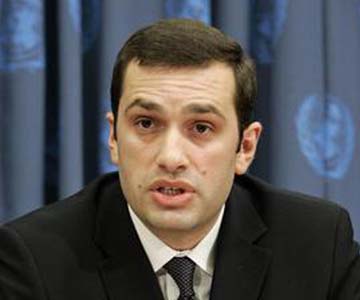
Was France Preparing to Supply the Latest Anti-Aircraft and Anti-Missile Systems to Georgia?
Publication: Eurasia Daily Monitor Volume: 12 Issue: 66
By:

Irakli Alasania, the former Georgian minister of defense (October 2012–November 2014), recently lifted the veil of secrecy over a mysterious document he signed during his visit to France in October 2014 (Newsday.ge, October 28, 2014). That memorandum of understanding (MoU), which was agreed to in Paris, had resulted in the most serious crisis in the ruling Georgian Dream coalition since its inception in October 2011. Reportedly, the agreement involved supplies of French air defense systems to Georgia.
Alasania asserts that several hours prior to signing the MoU on French air defense systems, he received a telephone call from Mindia Janelidze, who then served as the secretary of the Council of State Security and Crisis Management under the prime minister of Georgia. Speaking on behalf of Prime Minister Irakli Garibashvili, Janelidze allegedly ordered then–Defense Minister Alasania not to sign the agreement and find a “reasonable way out of the situation.” In response, Alasania asked the official to pass on his bewilderment to the head of government, but Janelidze called back after 15 minutes and repeated again that the prime minister insisted on canceling the agreement. Alasania responded that the only “reasonable way out of the situation” was to sign the agreement and went ahead with signing the memorandum (Editori.ge, March 31, 2015).
Within minutes of this telephone conversation in October of last year, five close associates of Irakli Alasania were arrested in Tbilisi. Investigators accused the men—all acting or former defense ministry officials—of corruption and embezzlement of $2.34 million in government funds. The funds were reportedly misused on a contract. Prosecutors say that the accused defense ministry officials signed a non-competitive, overpriced contract with Georgia’s leading telecommunications company, Silknet (Civil Georgia, October 28, 2014). Alasania has rejected all the accusations against his subordinates. The former government official stated, soon after the arrests, that a willful campaign against the Ministry of Defense was underway in order to discredit the agency, widely considered the most pro-Western in the country. According to Alasania, “some forces are trying to sway the country from […] entering NATO [the North Atlantic Treaty Organization] and wage a war on the defense ministry, which is responsible for integration into the North Atlantic Alliance” (Civil Georgia, November 1, 2014).
Soon after this statement, Prime Minister Garibashvili fired Alasania. Janelidze, who telephoned Alasania in Paris hours before the signing of the memorandum was due, replaced him as the new defense minister. Protesting against the prime minister’s decision, other government officials from Alasania’s Free Democrats party resigned from the Georgian Dream coalition, including Minister of Foreign Affairs Maia Panjikidze and State Minister for Euro-Atlantic Integration Alex Petriashvili (Civil Georgia, November 5, 2014). The Free Democrats’ departure significantly shrank the ruling coalition’s share of seats in the parliament (Civil Georgia, November 5, 2014).
Alasania and his colleagues still assert that the attempt to disrupt the signing of the MoU in Paris and the arrest of the high-profile defense ministry officials are “part of the same intrigue.” However, an anonymous source inside the ruling coalition told Jamestown that the intrigue was generated from both sides. The source, who is close to the prime minister’s inner circle, asserted: “When Irakli Alasania held talks about signing the protocol in France, he already knew that the prosecutors had launched a criminal investigation against his subordinates; and he needed [to generate] a scandal to politicize the actions of the prosecutor’s office” (Author’s interview, April 3).
This explanation, however, does not address some of the main issues related to the incident. Why was the Georgian government opposed to signing an agreement with France on supplies of anti-missile systems in the first place? What type of air defense equipment was France planning to sell Georgia? And was Paris really prepared to hand over such potent and expensive equipment to Georgia at a time when European countries, including France, have explicitly avoided supplying weaponry to Ukraine?
According to the Franco-Georgian MoU that was signed on October 28, 2014, the final agreement had to be concluded by April 1, 2015 (Newsday.ge, October 28, 2014). On April 3, after the deadline had passed, Alasania stated at a press conference that if the agreement had been fulfilled, Georgia could have completely protected itself from the Russian air force and even Iskander-class ballistic missiles. The former minister of defense said that France had been prepared to supply arms to Georgia, to be paid for with a long-term loan that Tbilisi could repay over several years (Interpressnews.ge, April 3).
Opposition United National Movement (UNM) deputy David Darchiashvili emphasized that the de-facto leader of the ruling coalition, billionaire Bidzina Ivanishvili, was behind the breakdown of the agreement. “He is a Russian oligarch and is afraid to anger Moscow,” Darchiashvili argued (Author’s interview, April 3).
Meanwhile, however, Prime Minister Garibashvili called Alasania’s statements nothing more than “speculation on the security of Georgia” (Ipress.ge, March 26). While current Minister of Defense Janelidze rebuked his predecessor for publicly discussing the French air defense systems. “The more Alasania and his party members speak on this issue, the more damage will be inflicted on our country,” Janelidze asserted (Rustavi2, April 1).
Independent experts, on the other hand, have expressed reservations as to Paris’ likely readiness to supply such potent armament to Georgia in the first place. The editor-in-chief of the military analytical journal Arsenali, Irakli Aladashvili, agreed that France produces the latest air defense systems, but he doubts Paris was prepared to supply such systems to Georgia—particularly, given Moscow’s sharp opposition to any Western military cooperation with Tbilisi. “Paris has supplied several civilian radar systems [to Georgia], and they are already operating; but I am very skeptical about the possibility of receiving anti-aircraft missiles and especially missiles capable of countering Iskanders,” Aladashvili stated. At the same time, the analyst expressed his doubts that any Western air defense system would be capable of effectively countering “this type of Russian short-range ballistic missile” (Author’s interview, April 3).
Mikhail Getsadze, a columnist of the news agency GHN, largely agrees with this sentiment. “A memorandum of understanding is one thing and a real agreement that requires the political decision of the top leadership of France is quite a different thing,” he told Jamestown (Author’s interview, April 3).
Nevertheless, many questions about this story still linger—a situation that has been exacerbated by the French government’s continued silence about the memorandum that was signed last October in Paris.




